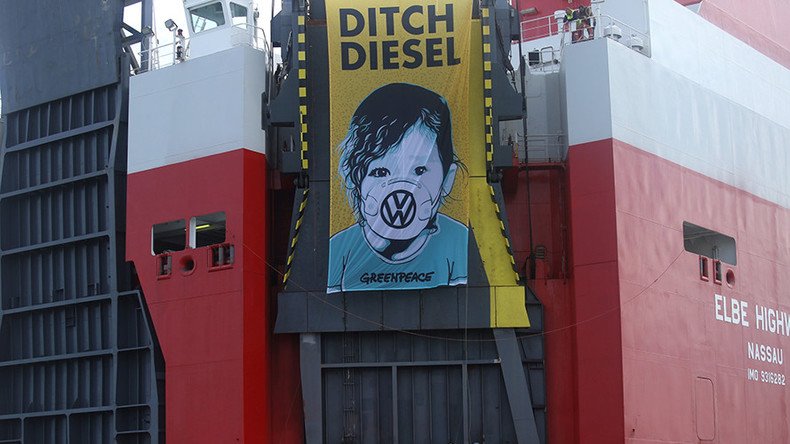Greenpeace: Has its crusade to save the world descended into hypocrisy & misinformation?

Greenpeace activists have seized a cargo ship at Sheerness Port, Kent, to stop thousands of Volkswagen diesel cars from entering the UK. Just the latest stunt in a series spanning decades, but is the environmentalist NGO only doing good?
The global non-profit, which claims to “defend the natural world and promote peace”, is renowned for its direct action stunts, often overstepping the line of legality, earning it a great deal of influence in environmental policymaking.
But the group has come under scrutiny in recent years for what some have deemed “foolish” demands, misinformation and hypocrisy.
COUNTERPRODUCTIVE
In fact, some of its positions, such as those on genetically modified (GM) crops and nuclear energy, have been defined as “counterproductive.”
Global Warming Policy Foundation (GWPF) Director Benny Peiser, told RT some of Greenpeace’s policy-positions risk “undermining the whole climate change campaign” as well as people’s wellbeing.
His claims echo those of 107 Nobel laureates who wrote a letter to Greenpeace last year urging it to stop its campaign against GM crops, as they are as safe, if not safer, as those derived from organic methods.
Greenpeace opposes GM crops, as it claims they may create “genetic pollution” and put public health and the environment at risk, despite extensive scientific research suggesting otherwise.
The letter read: “We urge Greenpeace and its supporters to re-examine the experience of farmers and consumers worldwide with crops and foods improved through biotechnology, recognize the findings of authoritative scientific bodies and regulatory agencies, and abandon their campaign against ‘GMOs’ in general and Golden Rice in particular.”
NUCLEAR ENERGY
Greenpeace’s anti-nuclear program has also been opposed by the group’s former boss Patrick Moore, who says that in order to reduce fossil fuels and greenhouse gases, nuclear energy production must be increased.
Peiser warned against the implications of phasing out nuclear energy, giving the example of Germany’s anti-nuclear efforts now leaving the country reliant on coal.
“Wherever nuclear stays out, the issue of CO2 comes up and that is undermining the whole climate change campaign,” he said.
BIG SHORT
Greenpeace, a self-declared anti-capitalist group, also made headlines after it emerged that one of its employees lost 3.8 million euros ($4.5m) betting on a fixed-rate currency exchange when the euro was gaining against other currencies.
It also emerged that Pascal Husting, Greenpeace International’s international program director, travelled 250 miles from Luxembourg to the company’s headquarters in Amsterdam by plane, despite the environmental group’s campaign to curb air travel.
SENSATIONALISM
Moore resigned from his post as President of Greenpeace Canada claiming the group he had founded has become a “monster” and its “environmental movement had abandoned science and logic in favor of emotion and sensationalism.”
This seems to back up allegations made against the company when it published its Greener Electronic Campaigns, which ranked tech companies according to their environmental policies and the amount of polluting substances they used to create their products.
The company ranked Nokia and Dell at the top, but essentially downgraded companies across the industry, including Apple, which was ranked 11 out of 14.
But Apple news blogger Daniel Eran criticized the guide in an article on RoughlyDrafted, saying the “ranking puts far more weight upon what companies publicly say rather than what they actually do.
“It is also clear that Greenpeace intended the report more as an attention-getting stunt than a serious rating of corporations’ actual responsibility.”














